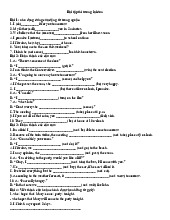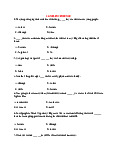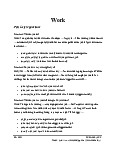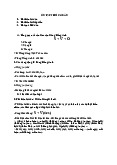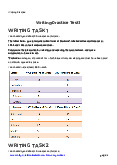









Preview text:
Thanks for downloading! LEARN IELTS VOCABULARY without a textbook
Here are my 5 favourite tips to help you learn new IELTS Vocabulary al by yourself! Let’s get started!
MarkTeacher.com - All rights reserved 1
Step 1 - Learn how to Google
Thanks to the internet and technology, students have access to the English-speaking world like never
before. It’s even estimated that 55% of all the content on the internet is in English.
How does that help you learn more vocabulary? One word: Google
2nd only to Facebook, Google is the king of internet search engines.
Google is so popular, it has even become a verb in English, meaning “to search for something online”
(I Google / You Google / He - She - It Googles)
A: “Hey, how tall is the Eiffel Tower?”
B: “I don’t know. Why don’t you Google it?”
Learning how to utilise this software effectively can be revolutionary for your vocabulary.
Here are some easy tricks you can use when you want to Google something: Define “________”
Reading an article and don’t understand a word? Simply search: “define Ambitious” you will get a full definition in seconds.
Use “Quotes” - Looking for a specific phrase or expression? You can type “a phrase or sentence”
surrounded by quotes and find definitions and examples.
Sometimes when you put some individual words together, they can have totally different meanings. These
are called collocations. For example: -
Throw (v.) - propel (something) with force through the air by a movement of the arm and hand -
A party (n.) - a social gathering of invited guests, typically involving eating, drinking, and entertainment.
But look at this collocation: “Michelle is throwing a party this weekend! I’m so excited!”
This means Michelle is having / hosting a party. Together, these two words create a new meaning. So
next time you see a word or phrase that is confusing, use Google to uncover all of its hidden meanings!
MarkTeacher.com - All rights reserved 2
Step 2 - Get your synonyms right
Let’s use your new Google skills to understand synonyms. Google: Define synonym
In everyday life, synonyms help you stop repeating yourself.
In advanced exams, like the IELTS, synonyms can help you demonstrate the full range of your English
vocabulary, which contributes towards your Lexical Range, 25% of your speaking and writing scores.
To develop your English vocabulary even more, another trick you can use in Google is to type ‘synonyms’
after your vocabulary word.
For example, if I want to find synonyms for the adjective ‘Ambitious’. I can type: ‘ambitious synonyms’
Here are the Google results:
MarkTeacher.com - All rights reserved 3
Dozens of synonyms in just a few seconds! Ea
sy, right? But it’s not as easy at that. Synonyms can vary
in terms of tone, connotation, and meaning.
Firstly, this list is completely overwhelming - there are too many words to remember. More importantly
though, many of the synonyms here are poor substitutes.
While ‘Ambitious’ is often referred to as a positive quality, ‘Pushy’ is negative, and similar to ‘impatient’ or ‘demanding’.
Also, ‘Hungry’ is quite positive, often related to sports or business, but ‘Power-hungry’ is quite scary
and dangerous, related to politics and military leaders.
Compare these two sentences:
“When I was a young child, I was always very power-hungry, so I studied really hard.”
“When I was a young child, I was always very ambitious, so I studied really hard.”
This proves that a lot of synonyms are not interchangeable. All of them have different nuance.
So you need to pick the right synonyms that match the type of message you want to share.
Step 3 - Read the vocabulary in a sentence
So how are you supposed to figure out if a synonym has the same or a different tone?
Sentences are your friend here.
There are several things to note when you look at a sentence:
MarkTeacher.com - All rights reserved 4 - Who - Who is mentioned? -
What - What kind of nouns do you see? (Business, jobs, places, etc.) -
Tone - is it positive, negative, or neutral? (Adverbs, adjectives, verbs) Look at the words
the word. Dictionary writers spend days thinking of the perfect example, in an
attempt to make every single word contribute to your understanding.
Look at these example sentences. Both of the highlighted words are synonyms. -
"I wanted to remain independent in my old age" -
"The federation included sixteen autonomous republics"
Independent is a more personal, descriptive adjective.
Autonomous is a impersonal, academic, political adjective. How can you tell? Independent: Who: I / my What: old age
Tone: wanted - remain. So we can understand that it’s a good quality that people want to keep. Autonomous: Who: federation What: republics
Tone: neutral with no people. So we can understand it’s usually about geography, governments or history.
So I shouldn’t say: “George doesn’t need help from anyone. He’s a very autonomous person. ”
And I should say: “George doesn’t need help from anyone. He’s a very independent person. ” Creating your own sentences
On top of that, looking at sentences in context will help you find collocations and get a better
understanding of how to make your own sentences too.
Take a look at this example sentence. The vocabulary word is “pressure”.
“Especially nowadays, I think children are under much more pressure from their parents to excel academically.”
How much can we learn from this sentence?
MarkTeacher.com - All rights reserved 5
a. A collocation / Preposition before : Under pressure
b. A determiner: much more pressure (now we also see that
is an uncountable noun)
c. Preposition after: from their parents
d. Infinitive verb after: to excel
With this information, I can make my own sentences: -
I am under so much pressure from my boss to finish my tasks on time. -
A lot of parents feel under a lot of pressure from society to provide the best possible education for their children. -
I wish I could be a young teenager again, because I wasn’t under any pressure from my parents to get a job!
See? All of that from just 1 example sentence!
So it’s clear to see why reading full sentences is essential for improving your vocabulary skills.
Not only can they can help you find appropriate synonyms, they can also show you how to make your own sentences, too.
So look closely at example sentences on Google or in your dictionary - there is a lot of information in just a few words. Step 4 - Get organised
So you’ve got your definitions, your synonyms, and your own sentences. How can you make sense of them all?
Many students choose to make vocabulary lists.
Here’s an example. The topic is “Companies”. Employees Revenue Busy Pressure Multinational Big dogs Oil and gas giants Hectic Emerging conglomerates
MarkTeacher.com - All rights reserved 6
Unfortunately, there are lots of problems with this list. It might make sense when you write it down, but
what about tomorrow, or next week? Our brains quickly forget words and examples they don’t hear often. -
Which ones are nouns, adjectives, or verbs? -
Which adjectives refer to companies (multinational), and which ones refer to people (busy, hectic)? -
Which ones only make sense in collocations? (Oil and gas giants) -
Which ones are slang and inappropriate for an essay? (Big dogs)
With some better organisation, you can create much more effective and accessible vocabulary notes.
As a teacher, I use http://coggle.it to create visually appealing and easy-to-make word webs to help
my students keep track of their new vocabulary.
Here is a better example of an organised word-web. This example is also about Companies:
My preference is to organise my word-webs grammatically, but you could make word-webs in many differents ways:
MarkTeacher.com - All rights reserved 7 - Formal & Informal - Positive & Negative -
Personal & Impersonal - People & Objects -
Questions & Answers (e.g. “A return ticket to Liverpool Street, please.”) You have total control!
My favourite thing is that Word-Webs can keep growing and growing. You can add more words, draw new
branches, connect branches together, and create a vast, brain-like web. You can physically see your knowledge expanding. Step 5 - Use it or lose it!
This is the final piece of the puzzle.
Knowing how to do it and actually doing it are two very different things.
Watching Arnold Schwarzenegger videos on YouTube doesn’t turn you into a bodybuilder, does it?
Practice exercises will help you, even simple ones will reinforce and solidify your knowledge.
There are 3 important R’s: Review Recycle Remember
There are lots of different exercise you can use to review and recycle your new vocabulary. -
Making your own sentences (like Step 3) - Gap-fills - Letter scramble -
Multiple choice questions
As we saw in Step 3, prepositions, determiners and collocations are all very important in improving your
overall understanding of a new word.
If I wanted to set a student a challenge for the word Pressure, which we saw in Step 3, I could make an
grammatical exercise like this:
a. “Parents put their children (over / under / beside) pressure to do well at school.”
b. “Athletes have to deal with (so more / so much / so many) pressure when they play.”
I could also make an exercise focused on the definition:
MarkTeacher.com - All rights reserved 8
Which person is more likely to feel under pressure?
a. Johnny missed an important deadline at work. His boss was really angry with him.
b. Barry finished his work early, so his boss gave him the afternoon off.
These practice exercises might seem simple, but they are important steps in helping you remember your
new vocabulary. Even simple practice exercise can be helpful. Apply it to your goals
Finally, put yourself in the situation you are going to face in the future.
If you’re studying for the IELTS, then practice IELTS questions! You can practice speaking with a partner,
a classmate, or even in the mirror! For the IELTS test, for example, give yourself a checklist of vocabulary,
(I recommend 7 words max.) then pick some IELTS questions, and try to use them in your answers. Summary
Here’s a quick roundup of the 5 key steps in this ebook. 1. Learn to Google a. ______ define b. Use “quotes”
2. Get your synonyms right
a. Not all synonyms have the same meaning
3. Read the vocabulary in sentences
a. Who / What / Tone - the words
the sentence can teach you something
b. Look for prepositions, collocations, determiners - trust the grammar! 4. Get organised
a. Use word-webs - http://coggle.it
b. Find a style that suits you 5. Use it or lose it!
a. Review → Recycle → Remember!
Bonus Step - Start right now!
MarkTeacher.com - All rights reserved 9
In fact, all of the content I mentioned in this EBook is available in my Essential IELTS Vocabulary
E-Course! You can get 50% OFF right here!
The 2-hour course includes:
Comprehensive definitions Accurate synonyms
LOTS of example sentences
Completed, downloadable Word-Webs (made by me) Practice exercises
High-band IELTS example answer videos
Dozens of IELTS Speaking Test questions (Part 1, 2 and 3)
A new vocabulary unit every month
Thank you very much for reading this ebook. I hope it was helpful. Please share it with your friends! Happy learning! Mark Teacher
MarkTeacher.com - All rights reserved 10
